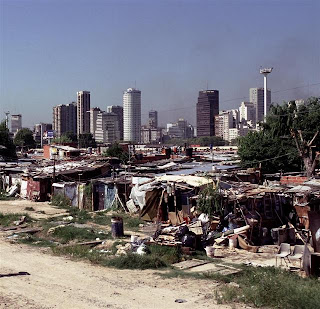
Well hello there everyone, from sunny 1586 Avenida Roosvelt, Buenos Aires. Here we've just about survived our first week in the Argentinian capital. It's been hard going at times but we've made it through.
Not that it's been a week without its fair share of challanges and problems, I'll have you know. First of all, my computer refused to allow itself to be connected to the internet. I shouted at it, told it to stop being so euro-centric and get used to working in South America, but all to no avail. I was unable to make Skype calls for three days or use the net to search for a flat. Finally, I was put onto Roque, a smiling, highly skilled Argentinian I.T. technician who solved my connection problems. Whilst Roque was working away, he cheerfully asked me if he could be excused for a moment and off he went to the bathroom, situated next to the computer room. Next of all I heard the sound of vomiting, before about five minutes later my brave technician emerged, smiling broadly as if he was fine. Typically English, I tried to make out that I hadn't heard a thing. Five minutes later he asked to be excused once again, there was yet more violent puking in the bathroom and my courageous technician emerged,, this time allowing himself to mention that he 'must have eaten something bad' that morning.
Still, he solved the computer problem and as I waved him goodbye, I was left to reflect that these Argentinians must be a tough breed. I returned to the bathroom and started cleaning the floor and putting bleach down the loo. Then I noticed my sixteen-month old daughter Sophia typing away playfully on the computer keyboard. Now, I didn't want to risk her facing the same fate as Roque so I picked her up and whisked her off to clean those little fingers for about ten minutes. If she'd picked up food poisoning from the keys it would have been a new form of computer virus.
I received further proof of Argentinians' toilet habits being different those of Italians the next day, whilst I was eating lunch in the Belgrano area. Looking out of the large glass windows of the 'Ramsey' cafe, I noticed a man who had just stopped directly in front of a large potted plant standing on the pavement. There, in broad daylight, he dropped his trousers and had a pee against the plant (I think it was a pine, but I'm not sure). Then, he did up his trousers and waited obediently alongside other people at the traffic lights for his turn to cross the road. None of the other pedestrians noticing his behaviour even gave him a second glance, suggesting that this is normal behaviour. Kind of like any English town centre after 11pm.
It's hard not to notice the giant security bars covering people's front doors and windows. They suggest that crime is a big problem here. Indeed, the TV is full of news about violent goings on, and people have advised us against choosing a flat of house on the ground floor because it's easier for robbers to get in. We've taken to 'dressing down' when we go out (much easier for me than for Daniela) and carrying as little money as possible (again much easier for me than for Daniela). It seems that there is a massive difference between rich and poor (see photo, above) without the sizeable middle class which we have in Europe.
Notwithstanding the dangers outside on the streets, its our humble little kitchen that has been the scene of this week's 'bloodbath'. When we first moved in, I found myself attracted to the enormous carving knife in the kitchen, probably provided for guests to cut those enormous Argentinian steaks. Whilst chopping an onion I cut off part of my thumb, which would have needed hospital treatment had we not yet organised our private health care insurance and had I not been afraid of going to an Argentina state hospital without being able to speak any Spanish. Daniela told me I was stupid and should have been more careful.
Now, when you love someone you should never rejoice in their suffering so I feel very humble when I admit that I did feel just a little sense of justification the following night when Daniela's efforts at chopping a tomato were swiftly followed by a chain of Italian swear words. Yes, the carving knife had claimed its second victim of the week.
The kitchen struck again whilst I was closing one of the drawers under the sink, only to find that it had a sharp metal lip which gave me one of those cuts on my hand like books can give you-almost invisible but very painful.
I was now becoming extremely paranoid every time that Sophia got near the kitchen, so Daniela, sensing this, sent me to the chemist's to stock up on plasters and antiseptic cream. Wise investments, judging by our first days in the kitchen.
By the way, last night the kitchen struck yet again. Unfortunately, the hot water boiler heats the water in an exaggarated manner and if you're not careful it can burn. Daniela found this out the hard way last night when water spilled on her big toa to treat the resulting burn with ice from the freezer.
From Buenos Aires, have a nice weekend. And if you're planning on doing anything in the kitchen, be careful.






















